Skills
Some skills may have a prerequisite. This means that you cannot purchase the skill unless you have also purchased the prerequisite.
If you buy a skill that has a prerequisite and then later get rid of that prerequisite, then all the skills that depended on the prerequisite become useless.
Alchemy (2.5 points per level)
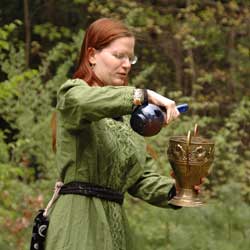
You can manufacture and identify potions and poison. There is no limit to the number of the levels of this skill you may purchase.
You may manufacture potions whose effects are equivalent to some spells. (See the "Potions" table to see the list of possible potions.)
You create your potions in "batches" which consist of a number of potions whose total spell levels are less than or equal to three times your level of Alchemy. The most powerful potion you can make is one whose spell level is twice your level of Alchemy. (Thus, a second-level alchemist could manufacture a batch consisting of one fourth-level potion and one second-level potion, or two third-level potions, or three second-level potions, etc.)
| Alchemy Level |
Total Spell Levels |
Max Level of Spell |
| 1 | 3 | 2 |
| 2 | 6 | 4 |
| 3 | 9 | 6 |
| 4 | 12 | 8 |
All potions must be consumed by the person they affect. (That is, a Charm potion must be consumed by the person to be charmed, not by the person performing the charming.) Potions whose effects are Test of Will (TOW) spells have an effective Will equal to your Alchemy level. For more information on how potions work, see "Using Items."
When you make a potion, you write a difficulty number less than or equal to your level of Alchemy on the outside of the potion. Any alchemist whose level is greater or equal to that number can then read the state-of-being scroll without consuming the potion, using the knowledge of alchemy to identify the potion's effects. All potions placed by GMs will also have a difficulty number assigned to them. (Potions without an assigned number are assumed to have a difficulty of one and thus may be identified by anyone with Alchemy.)
You may also make poison as if it were a second-level potion. (Poison, unlike a potion, will not "go bad.")
You may create one batch of potions before each game (during "check-in"). At multi-day games, you may create another batch of potions every morning.
Normal potions have no "shelf life," and become inert immediately after their game of creation, whether or not they were brought into the game. By spending one mark per level of a potion (for "preservatives"), you can create an "enduring" potion, which can be brought to any five games before becoming inert. By spending two marks per level of a potion, you can create an "extra-enduring" potion, which can be brought to any 10 games. You pay the cost when you create the potion (at check-in, and every morning at a multi-day game).
Potions created before a game need not be brought to that game, although potions created during a multi-day game are automatically brought to it.
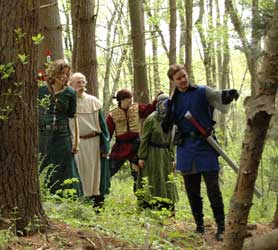
Awareness (1 point per level)
You can spot characters who are using the Stealth skill and other hidden things. Awareness is measured numerically with a minimum of zero (no points spent on Awareness) and no maximum (you can spend as many available points on Awareness as you wish).
Battlecast (6 points)
You have special training or ability in casting, such that you do not need to have your arms free of weapons while casting a Combat spell (i.e., you may ignore the "hands-free" rule). You may cast Combat spells while carrying a weapon during the casting. Exception: Combat spells cast through the Cleric Magic skill can be used freely with weapons in hand, and do not need Battlecast.
Brawling (1 point per level)
You are skilled in fighting in hand-to-hand (weaponless) combat with another unarmed character. Before an unarmed combat begins, all players announce their Brawling levels; the combatant with the highest level of Brawling wins any ties in the paper-rock-scissors contest. Thus, the best brawler has a two in three (rather than one in three) chance of success. Also, the number of blows you can take in a brawl is equal to three plus your Brawling level.
Exceptional Strength (2 points)
You are much stronger than average. When successful in a Brawling contest, you do double damage (one win takes away two brawling hits). In addition, your grip is so strong that nothing may be ripped out of it (as with the Strong Grip spell). Lastly, you count as two ordinary people when performing strenuous activity such as carrying people, heavy lifting, pushing, moving, etc.
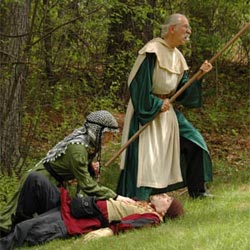
First Aid (0.5 points)
You can temporarily prevent someone from bleeding to death. To do so, you must place both hands on the critically bleeding target, and repeat the words "first aid." This pauses the target's bleeding. If you remove your hands, the target's bleeding resumes where it left off (the time it takes to bleed to death is not reset by First Aid).
First Aid requires the full use of your arms; you may not do anything else with them (such as fight, use a spell book, or carry the target) while using First Aid. If one of your arms is injured, you can perform First Aid with your uninjured arm; otherwise, you must use both arms. If both of your arms are injured, you can not perform First Aid.
Immunity to Poison (2 points)
This skill grants complete resistance to any poison, ingested or contact. You may still be wounded by poisoned weapons but will not suffer the effects of the poison.
Initiation, Cleric (1 point)
You have an intense spiritual connection to a deity (or other equivalent entity). Normally, this Initiation accompanies priesthood or other religious involvement. At certain times, you may be granted special advantages, such as Lore-like knowledge, the ability to read ancient languages, in-game information or abilities specific to clerics, and the use of certain magic items.
This skill is the prerequisite for Cleric Magic. It is required for anyone playing a member of the clergy, even if you do not have Cleric Magic.
Initiation, Mage (1 point)
You have completed study of the half-art, half-science that is formal magery. This study covers many arcane subjects, derived from ancient traditions and teachings. At certain times, you may be granted special advantages, such as Lore-like knowledge, the ability to read ancient languages, in-game information or abilities specific to mages, and the use of certain magic items (such as scrolls).
This skill is the prerequisite for Mage Magic.
Initiation, Mystic (1 point)
You have a unique mystical attunement which can provide access to magical powers outside of the standard Cleric and Mage abilities. At certain times, you may be granted special advantages, such as Lore-like knowledge, the ability to read ancient languages, in-game information or abilities specific to mystics, and the use of certain magic items.
This skill is the prerequisite for Mystic Magic.
Innate Power (1 point per spell point)
You have magical or special skills possessed by a non-human race, or you have an unusual background (though you may wish to use Mystic Magic instead).
Innate Powers allow you to "cast" a specific spell a certain number of times per day without a spell book. The cost of this skill is 1 point per level of the spell times the number of times per day the spell can be cast. Thus, a Pixie who wishes to have the ability to cast Blink (a third-level spell) twice per day would have to pay 3 (the spell level) x 2 (times/day), or 6 points.
Notes on Innate Powers
- Players should have a full understanding of the spells they choose and how they are affected by other spells, since they will not have a spell book handy to use as a reference.
- Innate Power does not automatically include Battlecast. An Innate Power that is a Combat spell is still bound by the "hands free" restrictions on holding a weapon, unless you buy Battlecast.
- Innate Power may be purchased after character creation, but only if permitted by your racial kit or unusual background proposal.
- Innate Power does not require an Initiation.
- Innate Powers recharge at sunrise.
- Users of an Innate Power whose spell description involves the caster's Magic level must instead use the level of that spell. For example, someone with the Innate Power to cast Mass Aversion (a fifth-level spell) could affect up to five people.
- Innate Powers cast on oneself (such as Blink) cannot be countered with counterspells such as Nullify or Reflect.
- Instead of using an Innate Power to cast a spell, you can choose to use it as a Nullify on one casting of that spell. (This still uses up your Innate Power for the day.)
You may only purchase or improve Innate Powers defined in your racial kit or unusual background proposal (these require approval from the Game World Committee for Continuing Games or from the GM(s) for One-Shot games).
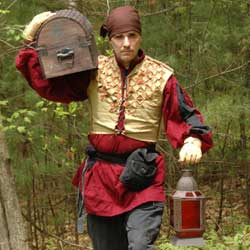
Locks (1 point per level)
You can pick locks. There are three levels of this skill. When you see a lock during an event, it will have a card with a number attached to it. If your level of Locks is equal to or higher than the number on the card, then you may open the lock. (Not every lock at an event may be pickable with this skill.) Picking a lock will normally take some amount of time to accomplish, as specified on the card.
Lore (1 point per level)
You have knowledge of a particular subject. There are three types of Lore at any given event (often "Monster," "Area," and "Item," but these subjects may vary from event to event). You will be informed of the subject matter of each Lore type for that event.
For each level of Lore, you may pick one of the three subjects. You should pick the Lore type(s) most appropriate to your background. You then receive a sheet of paper for each area of Lore containing your knowledge on that subject. The sheet is out-of-game; it represents knowledge in your head.
Magic (3 points per level)
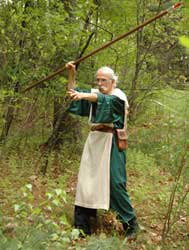
Prerequisite: an Initiation
You can cast spells. You may have one or more of three skills: Cleric Magic, Mage Magic, and Mystic Magic (See "Magic, Cleric," "Magic, Mage," or "Magic, Mystic" for details on these individual skills). Each skill is purchased in a number of levels. Each level grants access to a number of new spells.
Each level also grants "spell points" per day in that area of magic (typically 4 points per day at a tavern night, and 6 per day at a weekend-long event). These spell points are used when casting spells; casting a spell uses up a number of spell points equal to the level of the spell.
You may cast any spell in your spell book whose level is equal to or less than your level of Magic, provided you have the spell points available to do so.
There is also one special exception to the above: "up-casting" spells. Once per day, you may cast one spell that is one level higher than your present level of Magic. Up-casting this spell will fatigue you for five minutes. (This works like any fatigue—you cannot fight, run, or cast spells for five whole minutes.)
There are nine levels of each Magic skill (Mage, Cleric, and Mystic) available to PCs. The ninth level of each Magic skill costs 6 points instead of the normal 3.
| Magic Level | Total Cost |
Spell Pts. (Tavern) |
Spell Pts. (Weekend) |
| 1st | 3 | 4 | 6 |
| 2nd | 6 | 8 | 12 |
| 3rd | 9 | 12 | 18 |
| 4th | 12 | 16 | 24 |
| 5th | 15 | 20 | 30 |
| 6th | 18 | 24 | 36 |
| 7th | 21 | 28 | 42 |
| 8th | 24 | 32 | 48 |
| 9th | 30 | 36 | 54 |
Magic, Cleric (3 points per level)

Prerequisite: Cleric Initiation
You are a spell caster whose powers are bestowed on you by your deity. You have a large, fixed canon of spells which you may cast. These spells are primarily concentrated in the areas of healing and active defense. You only have a few offensive spells, some of which are at higher levels than normal, but in return you do not need the Battlecast skill – all of your spells can be cast with weapons in hand. You also have cheaper versions of some offensive spells which affect only undead and/or unholy beings.
You may also choose to take a clerical "kit," depending upon your deity, which may grant additional powers. See the Advanced Magic section for details.
Magic, Mage (3 points per level)
Prerequisite: Mage Initiation
You are a spell caster who has learned to cast spells through arcane study. You have a large, fixed canon of spells which you may cast. This includes a wide variety of offensive spells, a number of defensive spells that can be cast before a conflict, and powerful countermagic spells. However, you have no healing capability, except for being able to dispel magical effects.
You may also choose to take a mage "kit," reflecting a form of magic that you have chosen to specialize in. See the Advanced Magic section for details.
Magic, Mystic (3 points per level)
Prerequisite: Mystic Initiation
You are a spell caster who uses one of a variety of unclassifiable means to cast spells. You can customize your spell book to fit your own needs, but in exchange you get fewer spells than mages or clerics and the spells are sometimes more expensive. The rules for this are detailed in the separate "Mystic Magic" section.
Persuasion (1.5 points per level)
You are more persuasive than normal: you are silver-tongued, intimidating, or charming. Each calendar day (resetting at sunrise), you may use this skill once per your level of Persuasion. To use the skill, make a conversational attempt to persuade someone, and then display the "Persuasion" Card. Those around you must go along with what you say, within reasonable limits.
Persuasion will not make victims kill or injure themselves, violate most deeply held beliefs, or violate a direct order from legitimate authority. Persuasion will make them overlook loopholes, see exceptions, take bribes, and accept any reasonable story.
Others should react to Persuasion as they would to anyone making a persuasive story.
Poison (1 point per level)

You have facility in working with poison. (This means only the ability to use poison; this skill does not allow creation of or aid in acquiring poison.)
| Level | Ability gained |
| 1 | May poison food |
| 2 | May apply poison to weapons |
Poisoning Food
One dose of poison is sufficient to poison one food item or drink. To simulate this, place a piece of green tape on the bottom of the plate or cup (or in the food itself). Anyone who eats or drinks from it will become poisoned. If someone sees you attaching the green tape, you have been seen poisoning the food.
If you wish to preserve anonymity, a good way to inform someone that they have been poisoned is to tell a staff member out-of-game that a certain dish has been poisoned. The staff member will then tell the person(s) who ate the food to look under their plate, or will make a general out-of-game announcement. Keeping an eye on who actually consumes the poison is a good idea, as it is easy to lose track of what one ate.
Due to the slowness of the digestive process, you may wait up to two minutes before informing someone that they have been poisoned.
Poisoning Weapons
One dose of poison can poison weapons requiring up to 6 points of Weapon Skill to wield. (Zero-point weapons, traps, arrows, and crossbow bolts all count as requiring 1 point of Weapon Skill for this rule.) For example, someone with two doses of poison could poison a bastard sword; two plain swords; or two short swords, a throwing dagger, an arrow, and four traps.
Poison applied to a weapon wears off after being used in one combat—after that it dries out and becomes harmless. Poison applied to a trap remains active until the trap is sprung. Poisoned arrows and crossbow bolts lose their poison after one shot—they may not be reused while the green tape is still attached to them. (They may be re-poisoned, or the tape may simply be removed.)
You can have fractional doses of poison in your possession, but they are only useful in poisoning weapons and traps, and cannot be used to poison food.
Rapid Healing (2 points)
This lets you heal one limb wound quickly. Once per hour, even if unconscious, you may "accelerate" healing on a limb as if Knit Limb had been cast upon it.
Sage (3.5 points)
You have all three levels of Lore, plus additional Sage information.
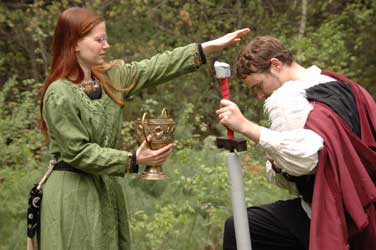
Status (1 or 2 points)
This skill is available to Continuing Game characters only.
You have standing in society. You command respect and your position may grant special rights or privileges. Status comes in two sub-types: Prominence and Social Distinction. For standard Continuing Game characters, both types of Status require approval from the Game World Committee. For "One-Shot" Games and CG Unique events, Status requires approval from the GM of that event.
Status: Prominence (2 points)
You have a form of standing among "polite" society. Your Status includes:
- the right to protection from the authorities in the event of danger
- the right to preferential treatment from the authorities
- the right to bear arms where others cannot (where appropriate to the locale and to your character concept)
- the right to have a bodyguard or champion bear arms (where appropriate to the locale and to your character concept)
- the right to refuse an honorable duel without dishonor
- the right to have someone fight on your behalf in a duel
- immunity to search without reasonable suspicion
- immunity to legal prosecution without reasonable suspicion
- the right to be treated as a generally honest person by the legal authorities, unless there is reasonable doubt
- Merchants and innkeeps will usually give you a discount of several marks per purchase, which makes most meals effectively free.
You must be publicly respectable and upright to take Prominence; otherwise the authorities would not treat you with kindness and concern.
Status: Social Distinction (1 point)
You receive special treatment from the "common folk," though not necessarily recognition from high society. Your Status includes:
- the right to preferential treatment from the authorities
- the right to bear arms where others cannot (where appropriate to the locale and to your character concept)
- immunity to legal prosecution without reasonable suspicion
- the right to be treated as a generally honest person by the common folk, unless there is reasonable doubt
- Innkeeps will usually give you a discount of a couple of marks per purchase, which makes most meals effectively free.
Social Distinction can come from: (1) a general reputation among the common folk, usually through visible heroism or other impressive acts; or (2) being conferred some form of lesser rank by the ruling authorities. For instance, a sheriff or king's ranger might have these rights. Sniveling cowards or obnoxious boors should not take Social Distinction, but neither should upper clergy or nobles.
Stealth (2 points per level)
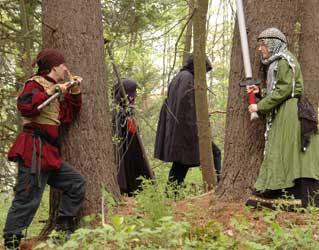
You carry a "Stealth Card" (an out-of-game item) with a number equal to your level of Stealth. You hold up the card whenever you do not want to be seen or heard (such as sneaking past some sentries or losing a pursuer). If your Stealth level is greater than the Awareness of the person trying to spot you, then you go unnoticed. The would-be spotter must role-play not seeing you. However, if the spotter's Awareness is equal to or greater than your Stealth, then the spotter may act normally (and role-play seeing you sneaking by).
When you use Stealth in this manner, you must make a reasonable effort to hide behind obstructions and in shadows as much as possible. You may not simply stride up a well-lit road holding your Stealth Card before you. Also remember that in order for the Stealth Card to work, the number on the card must be visible to those around you.
The Stealth skill also gives you the ability to pick pockets. You must get near your mark, flash your card, and announce which pocket or pouch you are picking. Again, if your Stealth exceeds your victim's Awareness, the theft goes unnoticed. You make your first lift from an individual at your actual Stealth level, but each subsequent lift from the same individual during an event lowers your effective Stealth by one for that victim. (Keep coming back to the same individual, and sooner or later you will be caught.) You may not steal items that are so large or unwieldy that the victim would instantly notice that they were gone, nor may you steal items that are under the direct attention of the victim, such as a sword held in the victim's hand.
If someone witnesses a theft attempt, sees the number on the Stealth Card, and has an Awareness lower than that number, they must role-play that they did not see the crime. Otherwise, they did witness the crime and may act as they wish.
Stealth also grants you the ability to "sap," or knock victims unconscious in a sneak attack. To sap someone, sneak up behind the victim and flash the back of your Stealth Card in the victim's face. (To perform multiple sap hits, move the Stealth Card rapidly up and down from the elbow. Each time it crosses the victim's eyes, it is considered another hit.) The victim will immediately fall over unconscious for five minutes. Because sapping represents a special type of attack, you need not carry a weapon to be able to sap someone. Either a full helm (covering both head and neck) or magical protection is effective against sap hits. Because sapping represents a precision strike, any armor with less coverage is bypassed. If you are attempting to hide while sapping, your victim's body can serve as cover provided you follow all other rules for using Stealth to hide.
Superior Clotting (2 points)
You have a superior constitution which increases bleeding times. If you receive three limb wounds or one good torso wound, you would normally fall unconscious immediately and bleed to death in two minutes. This skill increases your ability to tolerate wounds so that you will not fall unconscious until you receive one torso wound or four limb wounds (wounded area[s] are still unusable). It also reduces the blood loss so that you will die in 10 minutes instead of 2 minutes. You need not do anything, or even be conscious, since the body will slow the bleeding automatically.
Traps (1 point per level)
You can work with and set harmful traps. Each level of the skill lets you set increasingly fatal traps; higher levels of Traps cause damage to higher numbers of limbs.
| Level | Trap Ability |
| 1 | Annoyance trap |
| 2 | May disarm traps |
| 3 | Minor trap, wounds one limb |
| 4 | Severe trap, wounds two limbs |
| 5 | Lethal trap, wounds three limbs |
| 6 | Psycho trap, wounds four limbs |
Trap Damage
Traps cause damage like weapons do; protection (armor or magical protection) protects against them. Anyone (including the setter) who triggers a trap for any reason after it has been set will be affected by it.
An "annoyance trap" causes no damage, but is still bothersome. (E.g., "You smell like rotten garbage for 15 minutes. No one can stand to be near you" or "A bucket of cold water falls on your head.")
You may set a trap to affect more than one person, spreading the damage between multiple targets. A four-limb trap might read "You and the nearest three people, within 15 feet, each take one limb wound." If there are fewer than the specified number of people present, the extra damage is wasted.
You may also "convert" two limb wounds into one torso wound, so that a four-limb trap could cause one torso wound and two limb wounds, or two torso wounds.
Placing Traps
To place a trap, first write the effects of the trap on a piece of paper and attach the paper to the box. The effects of your traps are dictated by your Traps level (the higher the level, the more damaging the trap). You may wish to make a more vivid description of exactly what the trap is and what its effects are (e.g., a spear trap, a pit trap, etc.).
If you like, you may specify what limb(s) will be affected by your trap, and in what order they are affected (otherwise, the target picks undamaged limbs in any order).
Traps that affect multiple people must specify a reasonable area of effect: "You and the nearest three people, within 15 feet, each take a limb wound" is acceptable; "Within 100 feet" is not.
Finally, place the box where you want it, set the trigger, and flip the switch to "on."
Disarming and Resetting Traps
Traps can be avoided by anyone who sees them, but only someone with Traps level two or greater may disarm one.
To disarm a trap, simply walk up to it and switch it off.
The character who originally set the trap may disarm it and move it to a new location at any time, even if it has been triggered.
Traps may not be taken or moved except by their original setter, but anyone with a Traps level equal to or greater than a given trap may reset a trap in its original location.
Wealth (1 point per level)

You receive three extra marks per event per level of Wealth. Wealth levels are cumulative. You will receive this amount of money at every event.
For "One-Shot" games and CG Unique Events
One-shot games usually award five marks to start. You receive five extra marks per event per level, cumulatively. Thus, level one awards five extra marks, level two awards (5) + (5 + 5) = 15 marks, level three awards (5) + (5 + 5) + (5 + 5 + 5) = 30 marks, and so on.
Weapon Skill
See the separate section on Weapons Skill.
Will (1 point per level)
Your Will is your ability both to cast Test of Will (TOW) spells and to resist them. When a TOW spell is cast, the caster announces their Will. Only if this is greater than the target's Will does the spell have any effect. Will is measured numerically with a minimum of zero (no points spent on Will) and no maximum (you can spend as many available points on Will as you wish).
